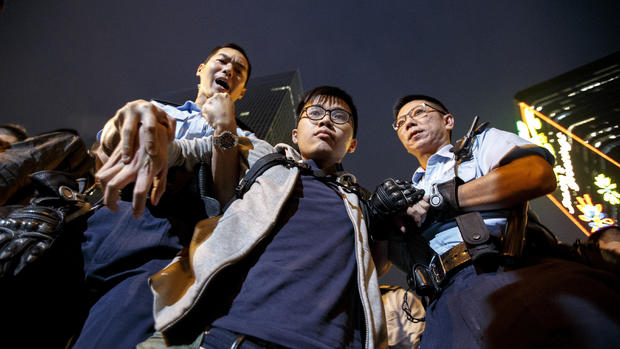Hong Kong protesters play chicken with China
HONG KONG -- Hong Kong's leader has told thousands of protesters in the city's streets that the central government in China will not meet their demands by backing away from a decision to limit voting reforms, but as CBS News' Seth Doane reports, the protesters aren't backing down either.
Instead of dispersing as their government has requested, protesters were replenishing supplies Tuesday morning, and there was a sense that they intended to stay for a while. In fact, says Doane, with China poised to celebrate its big "National Day" holiday on Wednesday, crowds were only expected to grow in a show of defiance.
Tens of thousands of pro-democracy demonstrators have been digging-in for days, and while they are are taking a more peaceful tone -- with some even singing in the streets -- they're also getting more specific: setting an October 1 deadline for democratic reforms, and demanding that Hong Kong's Beijing-backed chief executive step down.
For now, it doesn't look like they'll get their wish.
"The central government will not comply to illegal threats," Chief Executive Leung Chun-ying said Tuesday.
Protesters have vowed to remain united. In a show of solidarity overnight, thousands waved glowing cell phones in a sort of electronic vigil.
These have been the most significant protests since Hong Kong was handed over to Chinese rule from the British in 1997.
Over the weekend, police in riot gear used tear gas to try to disperse crowds, but the heavy-handed response may have only encouraged others to join.
"I watched the news and I saw the tear gas and I think the police had gone too far," said one man who decided to take to the streets.
"We are not armed, we are not using violence. We are just sitting on the street, we are hands-up," lamented another protester. "We only use umbrellas to defend against tear gas and pepper spray."
All those umbrellas prompted a nickname for the movement: "The Umbrella Revolution."
At the core, the demonstrators want the right to directly elect their new "chief executive" in 2017. Beijng's communist government has decreed, however, that only candidates vetted by a committee filled with Beijing loyalists will be permitted on the ballot.
Many in Hong Kong see that as reneging on the deal agreed with Beijing when Hong Kong was handed over. The arrangement was dubbed "One Country, Two Systems," and was meant to grant Hong Kong some degree of political freedom from the mainland, but the limits of that system are being sharply tested.
The scenes playing out in Hong Kong's streets now are leading some to draw comparisons to another student-led, pro-democracy protest in china; 25 years ago in the infamous Tiananmen Square crackdown.
Of course, there are a number of differences. Hong Kong has a robust media, so pictures of the demonstrations have spread around the world in real time. Very few of the images are making it to mainland China, however, where Instagram has become just the latest social media outlet blocked by government censors.
The difference in news coverage of the protests between Hong Kong and mainland China is striking: one Hong Kong newspaper's headline on Tuesday reads simply, "Democracy." An article in Beijing's China Daily newspaper, however, never even mentions "democracy," and talks instead only about snarled traffic, cancelled bus routes, and the stock market being down.
